Holistic Palliative Care: Managing Beliefs and Values at Western Uni
VerifiedAdded on 2023/06/13
|7
|1897
|366
Essay
AI Summary
This essay delves into the provision of holistic palliative healthcare, emphasizing the importance of addressing the physical, emotional, and spiritual needs of patients facing life-ending illnesses. It highlights strategies for healthcare providers, particularly nurses, to manage their personal beliefs and values while delivering optimal care to patients with diverse perspectives. The essay underscores the significance of communication, relationship building, and teamwork in ensuring comprehensive palliative care. Furthermore, it suggests practical approaches for nurses, such as fostering awareness of diverse beliefs, practicing acceptance, seeking specialized training, finding compromises, and setting boundaries, to navigate potential conflicts between their values and patients' needs, ultimately enhancing the quality of life for individuals in palliative care. This document is available on Desklib, a platform offering study tools and solved assignments for students.
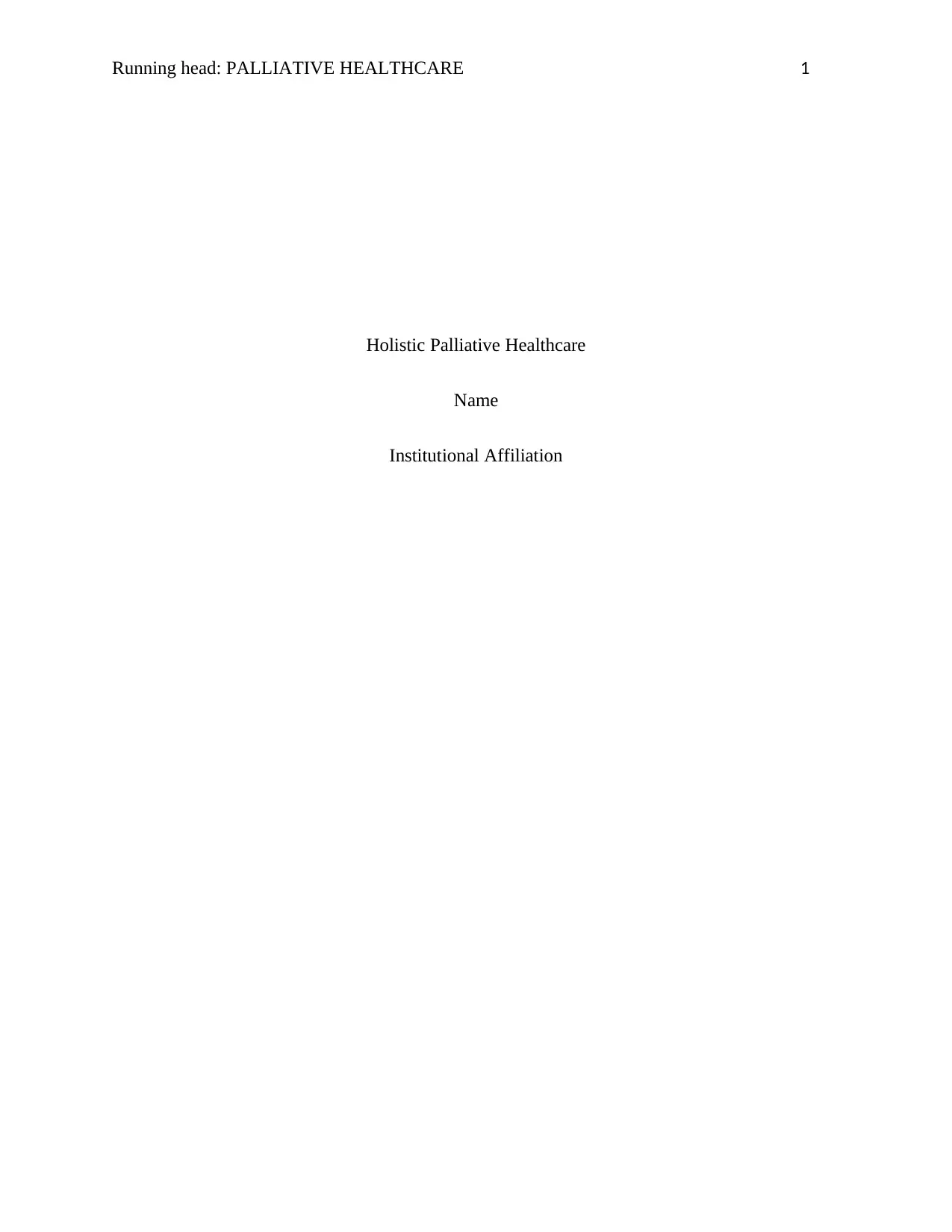
Running head: PALLIATIVE HEALTHCARE 1
Holistic Palliative Healthcare
Name
Institutional Affiliation
Holistic Palliative Healthcare
Name
Institutional Affiliation
Paraphrase This Document
Need a fresh take? Get an instant paraphrase of this document with our AI Paraphraser
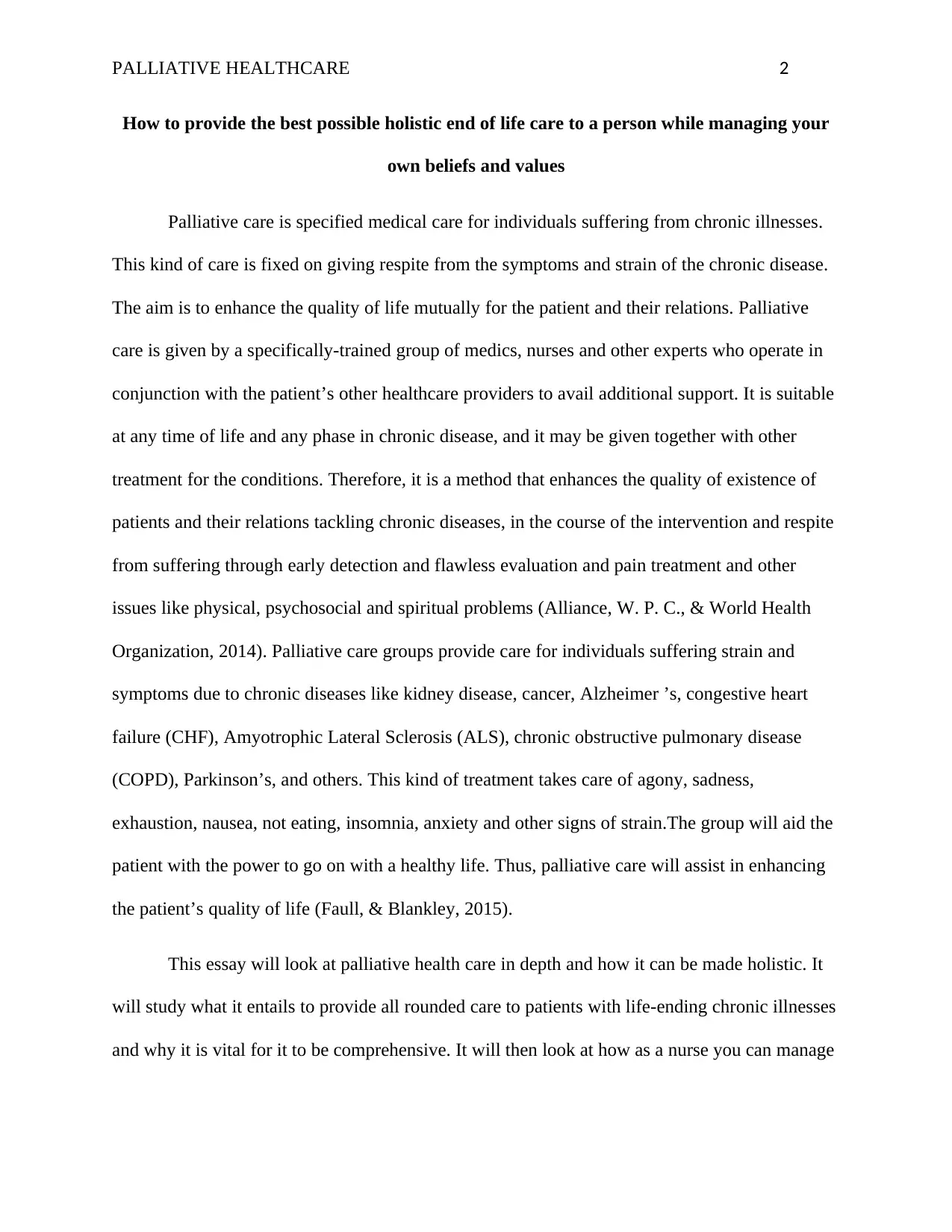
PALLIATIVE HEALTHCARE 2
How to provide the best possible holistic end of life care to a person while managing your
own beliefs and values
Palliative care is specified medical care for individuals suffering from chronic illnesses.
This kind of care is fixed on giving respite from the symptoms and strain of the chronic disease.
The aim is to enhance the quality of life mutually for the patient and their relations. Palliative
care is given by a specifically-trained group of medics, nurses and other experts who operate in
conjunction with the patient’s other healthcare providers to avail additional support. It is suitable
at any time of life and any phase in chronic disease, and it may be given together with other
treatment for the conditions. Therefore, it is a method that enhances the quality of existence of
patients and their relations tackling chronic diseases, in the course of the intervention and respite
from suffering through early detection and flawless evaluation and pain treatment and other
issues like physical, psychosocial and spiritual problems (Alliance, W. P. C., & World Health
Organization, 2014). Palliative care groups provide care for individuals suffering strain and
symptoms due to chronic diseases like kidney disease, cancer, Alzheimer ’s, congestive heart
failure (CHF), Amyotrophic Lateral Sclerosis (ALS), chronic obstructive pulmonary disease
(COPD), Parkinson’s, and others. This kind of treatment takes care of agony, sadness,
exhaustion, nausea, not eating, insomnia, anxiety and other signs of strain.The group will aid the
patient with the power to go on with a healthy life. Thus, palliative care will assist in enhancing
the patient’s quality of life (Faull, & Blankley, 2015).
This essay will look at palliative health care in depth and how it can be made holistic. It
will study what it entails to provide all rounded care to patients with life-ending chronic illnesses
and why it is vital for it to be comprehensive. It will then look at how as a nurse you can manage
How to provide the best possible holistic end of life care to a person while managing your
own beliefs and values
Palliative care is specified medical care for individuals suffering from chronic illnesses.
This kind of care is fixed on giving respite from the symptoms and strain of the chronic disease.
The aim is to enhance the quality of life mutually for the patient and their relations. Palliative
care is given by a specifically-trained group of medics, nurses and other experts who operate in
conjunction with the patient’s other healthcare providers to avail additional support. It is suitable
at any time of life and any phase in chronic disease, and it may be given together with other
treatment for the conditions. Therefore, it is a method that enhances the quality of existence of
patients and their relations tackling chronic diseases, in the course of the intervention and respite
from suffering through early detection and flawless evaluation and pain treatment and other
issues like physical, psychosocial and spiritual problems (Alliance, W. P. C., & World Health
Organization, 2014). Palliative care groups provide care for individuals suffering strain and
symptoms due to chronic diseases like kidney disease, cancer, Alzheimer ’s, congestive heart
failure (CHF), Amyotrophic Lateral Sclerosis (ALS), chronic obstructive pulmonary disease
(COPD), Parkinson’s, and others. This kind of treatment takes care of agony, sadness,
exhaustion, nausea, not eating, insomnia, anxiety and other signs of strain.The group will aid the
patient with the power to go on with a healthy life. Thus, palliative care will assist in enhancing
the patient’s quality of life (Faull, & Blankley, 2015).
This essay will look at palliative health care in depth and how it can be made holistic. It
will study what it entails to provide all rounded care to patients with life-ending chronic illnesses
and why it is vital for it to be comprehensive. It will then look at how as a nurse you can manage
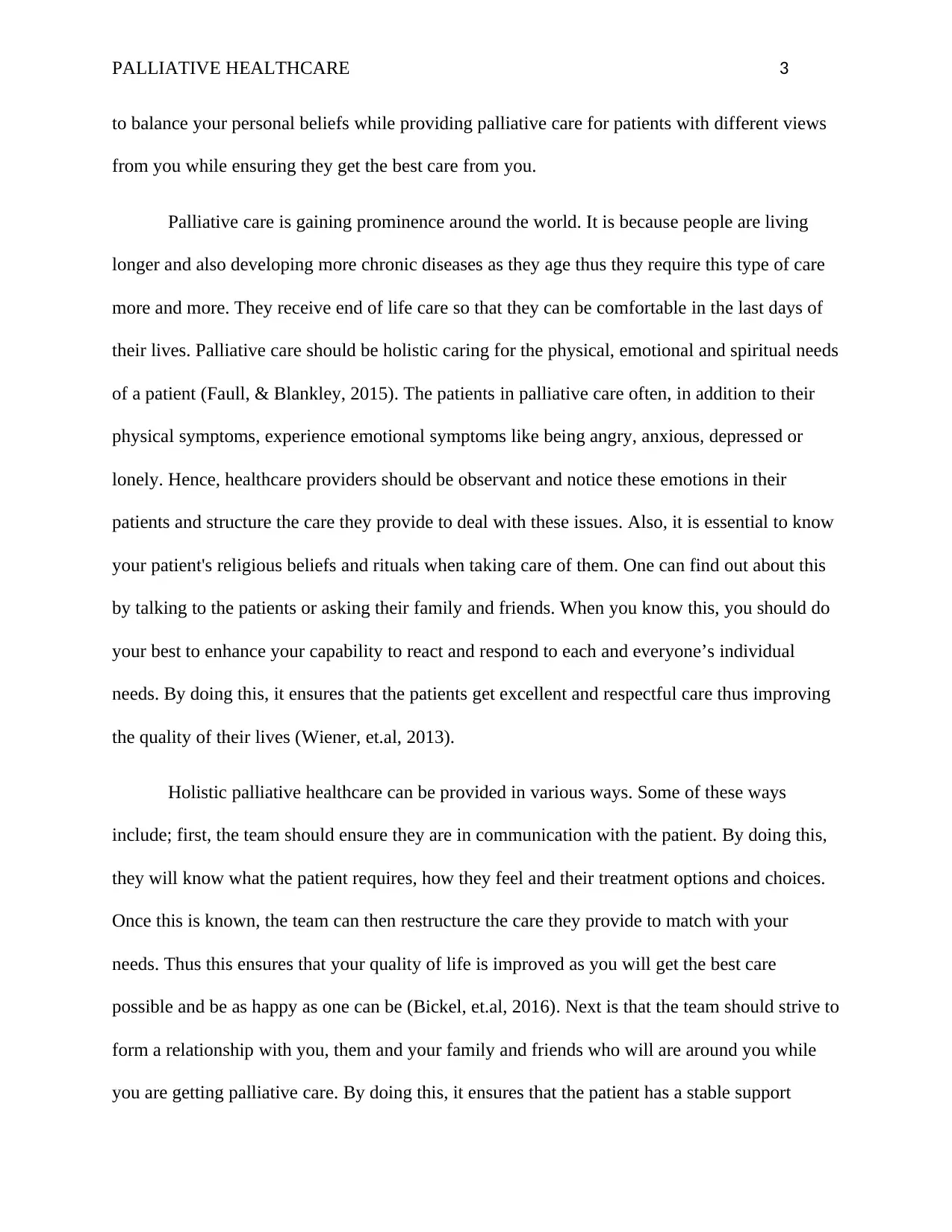
PALLIATIVE HEALTHCARE 3
to balance your personal beliefs while providing palliative care for patients with different views
from you while ensuring they get the best care from you.
Palliative care is gaining prominence around the world. It is because people are living
longer and also developing more chronic diseases as they age thus they require this type of care
more and more. They receive end of life care so that they can be comfortable in the last days of
their lives. Palliative care should be holistic caring for the physical, emotional and spiritual needs
of a patient (Faull, & Blankley, 2015). The patients in palliative care often, in addition to their
physical symptoms, experience emotional symptoms like being angry, anxious, depressed or
lonely. Hence, healthcare providers should be observant and notice these emotions in their
patients and structure the care they provide to deal with these issues. Also, it is essential to know
your patient's religious beliefs and rituals when taking care of them. One can find out about this
by talking to the patients or asking their family and friends. When you know this, you should do
your best to enhance your capability to react and respond to each and everyone’s individual
needs. By doing this, it ensures that the patients get excellent and respectful care thus improving
the quality of their lives (Wiener, et.al, 2013).
Holistic palliative healthcare can be provided in various ways. Some of these ways
include; first, the team should ensure they are in communication with the patient. By doing this,
they will know what the patient requires, how they feel and their treatment options and choices.
Once this is known, the team can then restructure the care they provide to match with your
needs. Thus this ensures that your quality of life is improved as you will get the best care
possible and be as happy as one can be (Bickel, et.al, 2016). Next is that the team should strive to
form a relationship with you, them and your family and friends who will are around you while
you are getting palliative care. By doing this, it ensures that the patient has a stable support
to balance your personal beliefs while providing palliative care for patients with different views
from you while ensuring they get the best care from you.
Palliative care is gaining prominence around the world. It is because people are living
longer and also developing more chronic diseases as they age thus they require this type of care
more and more. They receive end of life care so that they can be comfortable in the last days of
their lives. Palliative care should be holistic caring for the physical, emotional and spiritual needs
of a patient (Faull, & Blankley, 2015). The patients in palliative care often, in addition to their
physical symptoms, experience emotional symptoms like being angry, anxious, depressed or
lonely. Hence, healthcare providers should be observant and notice these emotions in their
patients and structure the care they provide to deal with these issues. Also, it is essential to know
your patient's religious beliefs and rituals when taking care of them. One can find out about this
by talking to the patients or asking their family and friends. When you know this, you should do
your best to enhance your capability to react and respond to each and everyone’s individual
needs. By doing this, it ensures that the patients get excellent and respectful care thus improving
the quality of their lives (Wiener, et.al, 2013).
Holistic palliative healthcare can be provided in various ways. Some of these ways
include; first, the team should ensure they are in communication with the patient. By doing this,
they will know what the patient requires, how they feel and their treatment options and choices.
Once this is known, the team can then restructure the care they provide to match with your
needs. Thus this ensures that your quality of life is improved as you will get the best care
possible and be as happy as one can be (Bickel, et.al, 2016). Next is that the team should strive to
form a relationship with you, them and your family and friends who will are around you while
you are getting palliative care. By doing this, it ensures that the patient has a stable support
⊘ This is a preview!⊘
Do you want full access?
Subscribe today to unlock all pages.

Trusted by 1+ million students worldwide

PALLIATIVE HEALTHCARE 4
system around them while getting the care. It also ensures that the family is informed of the
patient ’s progress all through and if they require anything they can communicate with their
family and friends through the team (Quill & Abernethy, 2013). Finally, the palliative healthcare
team should ensure that they as a team know how to work together well. Thus nurses will be able
to get information about the patients and relay to the doctors. It ensures that the patient receives
the best care possible (Detering, et.al, 2010).
As palliative healthcare providers, we can use different approaches when we want to
manage our personal beliefs and values while giving the holistic end of life care. First, as
healthcare providers we should be aware that there are people who have beliefs that differ from
our own. You can do this by asking about it from friends or researching online. Once you are
knowledgeable about the different cultures and beliefs in existence, you will not be shocked
when caring for individuals with these different beliefs. (Alcorn, et.al, 2010). Another way is that
nurses should learn to have acceptance. Once they are aware of the existence of different beliefs,
they should accept that people are different hence respect them and their beliefs. Thus, by
accepting this fact you can be respectful while taking care of your patient. Next, nurses should
get the training on how to treat different patients in various situations thus this ensures that they
are ready for anything. Hence in case of anything they are prepared to handle the cases and give
the patient the best experience while they are in their care (Curtis, et.al, 2011).
Next as a nurse when caring for a palliative patient whose beliefs go against yours, you
should try and find a compromise. It means you should find a way to meet them in the middle.
Therefore you should talk to the patient and find ways in which you can care for them without
being disrespectful but at the same time not go against your beliefs (Sudore & Fried, 2010).
Next, as a nurse you should also learn to set boundaries while at work. It can be done as a last
system around them while getting the care. It also ensures that the family is informed of the
patient ’s progress all through and if they require anything they can communicate with their
family and friends through the team (Quill & Abernethy, 2013). Finally, the palliative healthcare
team should ensure that they as a team know how to work together well. Thus nurses will be able
to get information about the patients and relay to the doctors. It ensures that the patient receives
the best care possible (Detering, et.al, 2010).
As palliative healthcare providers, we can use different approaches when we want to
manage our personal beliefs and values while giving the holistic end of life care. First, as
healthcare providers we should be aware that there are people who have beliefs that differ from
our own. You can do this by asking about it from friends or researching online. Once you are
knowledgeable about the different cultures and beliefs in existence, you will not be shocked
when caring for individuals with these different beliefs. (Alcorn, et.al, 2010). Another way is that
nurses should learn to have acceptance. Once they are aware of the existence of different beliefs,
they should accept that people are different hence respect them and their beliefs. Thus, by
accepting this fact you can be respectful while taking care of your patient. Next, nurses should
get the training on how to treat different patients in various situations thus this ensures that they
are ready for anything. Hence in case of anything they are prepared to handle the cases and give
the patient the best experience while they are in their care (Curtis, et.al, 2011).
Next as a nurse when caring for a palliative patient whose beliefs go against yours, you
should try and find a compromise. It means you should find a way to meet them in the middle.
Therefore you should talk to the patient and find ways in which you can care for them without
being disrespectful but at the same time not go against your beliefs (Sudore & Fried, 2010).
Next, as a nurse you should also learn to set boundaries while at work. It can be done as a last
Paraphrase This Document
Need a fresh take? Get an instant paraphrase of this document with our AI Paraphraser
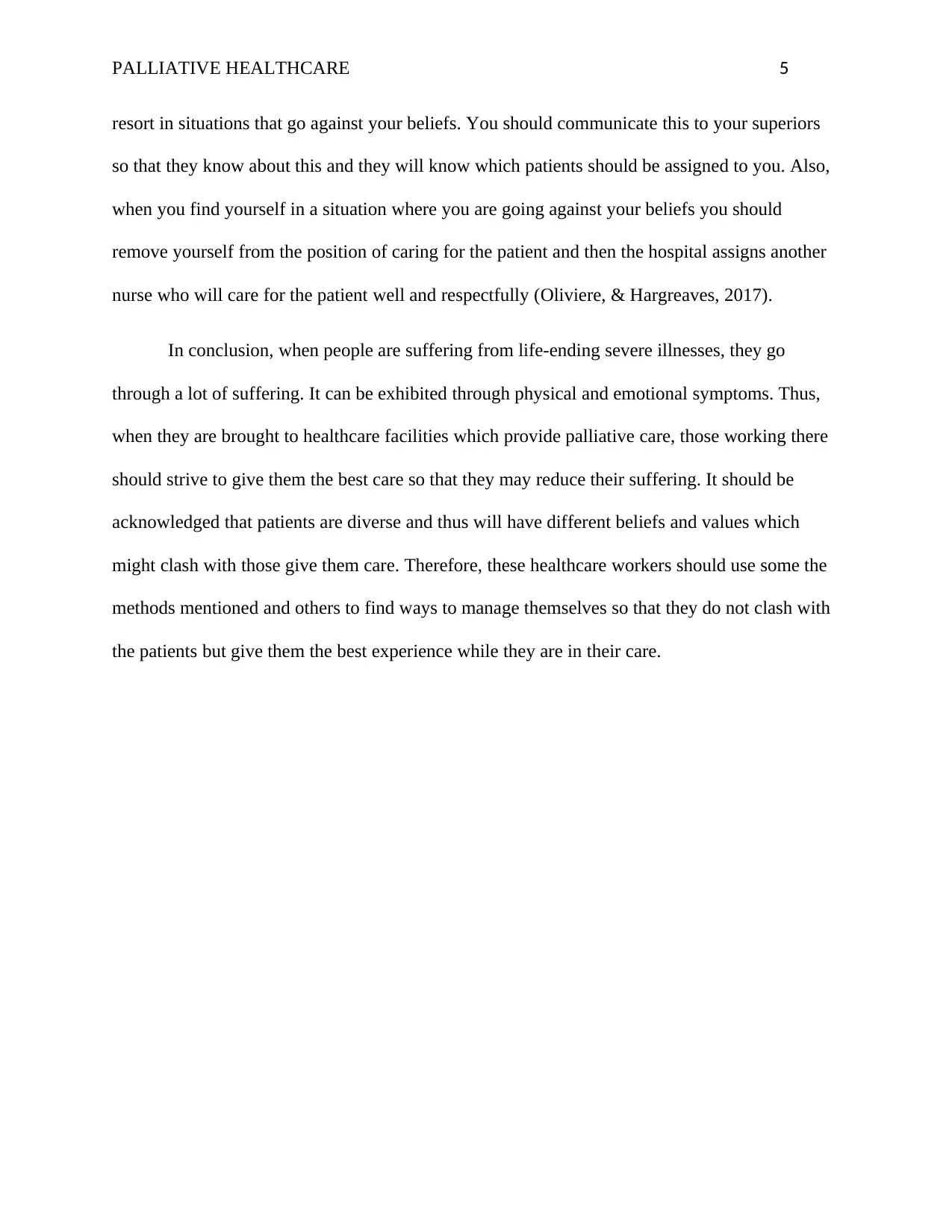
PALLIATIVE HEALTHCARE 5
resort in situations that go against your beliefs. You should communicate this to your superiors
so that they know about this and they will know which patients should be assigned to you. Also,
when you find yourself in a situation where you are going against your beliefs you should
remove yourself from the position of caring for the patient and then the hospital assigns another
nurse who will care for the patient well and respectfully (Oliviere, & Hargreaves, 2017).
In conclusion, when people are suffering from life-ending severe illnesses, they go
through a lot of suffering. It can be exhibited through physical and emotional symptoms. Thus,
when they are brought to healthcare facilities which provide palliative care, those working there
should strive to give them the best care so that they may reduce their suffering. It should be
acknowledged that patients are diverse and thus will have different beliefs and values which
might clash with those give them care. Therefore, these healthcare workers should use some the
methods mentioned and others to find ways to manage themselves so that they do not clash with
the patients but give them the best experience while they are in their care.
resort in situations that go against your beliefs. You should communicate this to your superiors
so that they know about this and they will know which patients should be assigned to you. Also,
when you find yourself in a situation where you are going against your beliefs you should
remove yourself from the position of caring for the patient and then the hospital assigns another
nurse who will care for the patient well and respectfully (Oliviere, & Hargreaves, 2017).
In conclusion, when people are suffering from life-ending severe illnesses, they go
through a lot of suffering. It can be exhibited through physical and emotional symptoms. Thus,
when they are brought to healthcare facilities which provide palliative care, those working there
should strive to give them the best care so that they may reduce their suffering. It should be
acknowledged that patients are diverse and thus will have different beliefs and values which
might clash with those give them care. Therefore, these healthcare workers should use some the
methods mentioned and others to find ways to manage themselves so that they do not clash with
the patients but give them the best experience while they are in their care.
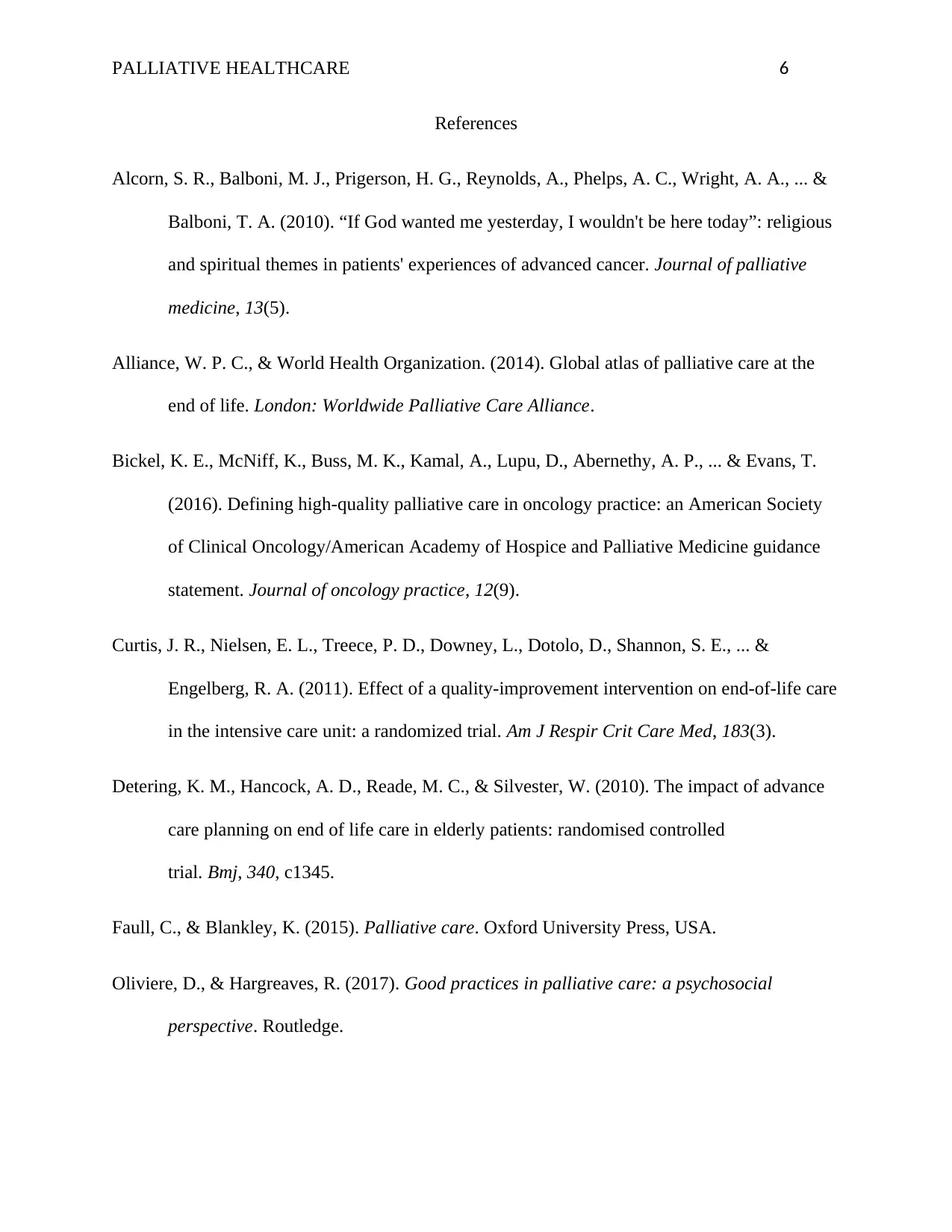
PALLIATIVE HEALTHCARE 6
References
Alcorn, S. R., Balboni, M. J., Prigerson, H. G., Reynolds, A., Phelps, A. C., Wright, A. A., ... &
Balboni, T. A. (2010). “If God wanted me yesterday, I wouldn't be here today”: religious
and spiritual themes in patients' experiences of advanced cancer. Journal of palliative
medicine, 13(5).
Alliance, W. P. C., & World Health Organization. (2014). Global atlas of palliative care at the
end of life. London: Worldwide Palliative Care Alliance.
Bickel, K. E., McNiff, K., Buss, M. K., Kamal, A., Lupu, D., Abernethy, A. P., ... & Evans, T.
(2016). Defining high-quality palliative care in oncology practice: an American Society
of Clinical Oncology/American Academy of Hospice and Palliative Medicine guidance
statement. Journal of oncology practice, 12(9).
Curtis, J. R., Nielsen, E. L., Treece, P. D., Downey, L., Dotolo, D., Shannon, S. E., ... &
Engelberg, R. A. (2011). Effect of a quality-improvement intervention on end-of-life care
in the intensive care unit: a randomized trial. Am J Respir Crit Care Med, 183(3).
Detering, K. M., Hancock, A. D., Reade, M. C., & Silvester, W. (2010). The impact of advance
care planning on end of life care in elderly patients: randomised controlled
trial. Bmj, 340, c1345.
Faull, C., & Blankley, K. (2015). Palliative care. Oxford University Press, USA.
Oliviere, D., & Hargreaves, R. (2017). Good practices in palliative care: a psychosocial
perspective. Routledge.
References
Alcorn, S. R., Balboni, M. J., Prigerson, H. G., Reynolds, A., Phelps, A. C., Wright, A. A., ... &
Balboni, T. A. (2010). “If God wanted me yesterday, I wouldn't be here today”: religious
and spiritual themes in patients' experiences of advanced cancer. Journal of palliative
medicine, 13(5).
Alliance, W. P. C., & World Health Organization. (2014). Global atlas of palliative care at the
end of life. London: Worldwide Palliative Care Alliance.
Bickel, K. E., McNiff, K., Buss, M. K., Kamal, A., Lupu, D., Abernethy, A. P., ... & Evans, T.
(2016). Defining high-quality palliative care in oncology practice: an American Society
of Clinical Oncology/American Academy of Hospice and Palliative Medicine guidance
statement. Journal of oncology practice, 12(9).
Curtis, J. R., Nielsen, E. L., Treece, P. D., Downey, L., Dotolo, D., Shannon, S. E., ... &
Engelberg, R. A. (2011). Effect of a quality-improvement intervention on end-of-life care
in the intensive care unit: a randomized trial. Am J Respir Crit Care Med, 183(3).
Detering, K. M., Hancock, A. D., Reade, M. C., & Silvester, W. (2010). The impact of advance
care planning on end of life care in elderly patients: randomised controlled
trial. Bmj, 340, c1345.
Faull, C., & Blankley, K. (2015). Palliative care. Oxford University Press, USA.
Oliviere, D., & Hargreaves, R. (2017). Good practices in palliative care: a psychosocial
perspective. Routledge.
⊘ This is a preview!⊘
Do you want full access?
Subscribe today to unlock all pages.

Trusted by 1+ million students worldwide

PALLIATIVE HEALTHCARE 7
Quill, T. E., & Abernethy, A. P. (2013). Generalist plus specialist palliative care—creating a
more sustainable model. New England Journal of Medicine, 368(13).
Sudore, R. L., & Fried, T. R. (2010). Redefining the “planning” in advance care planning:
preparing for end-of-life decision making. Annals of internal medicine, 153(4).
Wiener, L., McConnell, D. G., Latella, L., & Ludi, E. (2013). Cultural and religious
considerations in pediatric palliative care. Palliative & supportive care, 11(1).
Quill, T. E., & Abernethy, A. P. (2013). Generalist plus specialist palliative care—creating a
more sustainable model. New England Journal of Medicine, 368(13).
Sudore, R. L., & Fried, T. R. (2010). Redefining the “planning” in advance care planning:
preparing for end-of-life decision making. Annals of internal medicine, 153(4).
Wiener, L., McConnell, D. G., Latella, L., & Ludi, E. (2013). Cultural and religious
considerations in pediatric palliative care. Palliative & supportive care, 11(1).
1 out of 7
Related Documents
Your All-in-One AI-Powered Toolkit for Academic Success.
+13062052269
info@desklib.com
Available 24*7 on WhatsApp / Email
![[object Object]](/_next/static/media/star-bottom.7253800d.svg)
Unlock your academic potential
Copyright © 2020–2026 A2Z Services. All Rights Reserved. Developed and managed by ZUCOL.





